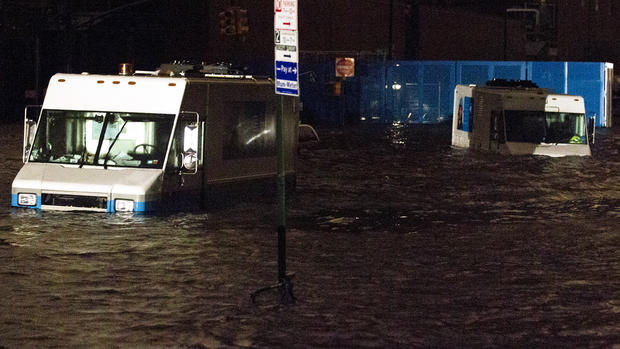U.N. leader: Sandy a lesson in climate change
UNITED NATIONS Secretary-General Ban Ki-moon says one of the lessons from Superstorm Sandy is the need for global action to deal with future climate shocks.
A new round of global climate talks starts in Doha, Qatar on Nov. 27, and Ban urged nations to reach a binding agreement by 2015 to curtail emissions of heat-trapping gases in order to stop the planet from overheating.
He told the U.N. General Assembly on Friday that it is difficult to attribute any single storm to climate change, but the world already knows that "extreme weather due to climate change is the new normal."
- Will Sandy change the climate change conversation?
- Bloomberg endorses Obama, citing climate change
- Rich-poor divide at U.N. climate talks
The U.N. saw direct effects of the superstorm, which damaged its headquarters with flooding that shut it down for three days. Electrical components and the U.N. computer system were damaged.
Ki-moon is not the first one to bring up climate change in discussions about superstorm Sandy. New York Gov. Andrew Cuomo was asked about it in a press briefing hours after the storm on Oct. 30, but was careful about ruffling political feathers.
"There has been a series of extreme weather incidents. That is not a political statement. That is a factual statement,"Cuomo said. "Anyone who says there's not a dramatic change in weather patterns, I think, is denying reality."
Two days later he added, "I think part of learning from this is realize that climate change is a reality."
New York City Mayor Michael Bloomberg also brought up superstorm Sandy and climate change in an op-ed endorsing President Barack Obama for re-election.
"Our climate is changing," Bloomberg wrote. "And while the increase in extreme weather we have experienced in New York City and around the world may or may not be the result of it, the risk that it might be - given this week's devastation [from Sandy] - should compel all elected leaders to take immediate action."
Meteorologists say that superstorm Sandy -- which started off as a hurricane before making landfall in New Jersey almost two weeks ago -- was particularly rare and dangerous because it collided with a cold weather system from the west, combining into an extreme hybrid storm.
